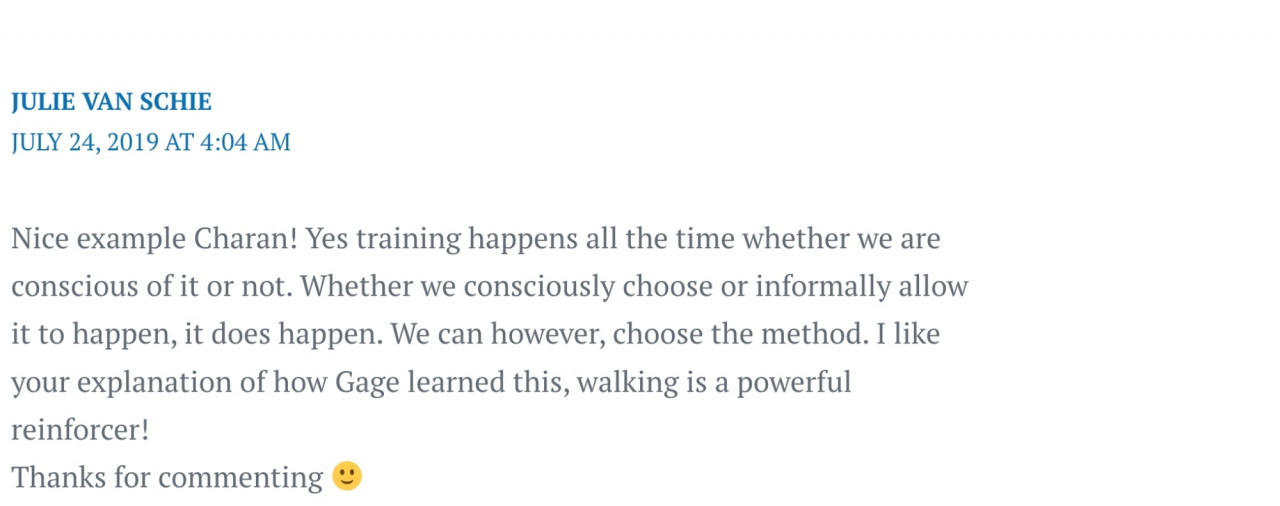For all the dogs who've touched our hearts
Should You Use Food to Train Your Dog?
People struggle with using food to train their dog, but if you choose not to use food, what are you really choosing?

Should You Use Food to Train Your Dog?
But... is that the right question?

People struggle with the idea of using food to train their dog. They think it’s bribery, or worry about the dog relying on it. These skills need to be learned to train your dog well, but there's a bigger question to be asked: if you decide not to use food, what are you choosing instead?



Reinforcement or Punishment?

The young woman standing in front of me looked at the ground and began to cry. “I love him so much” she sobbed, “I just want to do the right thing.” Confronted with her dog’s growing aggression, Helen was desperate and considering booking Freddie in with a “specialist” training group. I took a deep breath and asked about their methods, especially interested if they used food. “A little bit sometimes, but not usually” was the answer.

Positive reinforcement dog trainers around the world become concerned when they hear that trainers, classes, clients are not using food. This isn’t because we are wedded to food, there are many other wonderful reinforcers, but the absence of it usually suggests something else – punishment-based methods.

Food is the go-to reinforcer for positive reinforcement-based trainers and classes. It is convenient, reasonably easy to use and dogs love it. We use food because we want to create behaviour with fun and motivation.

Choices

Train the behaviour you want


There are many studies showing the benefits of using positive reinforcement.
It's effective, forgiving and most of all creates learners who work eagerly. Training with positive reinforcement creates an internal state of willingness, enthusiasm and trust. It makes dogs happy about working with us.

Suppress the behaviour you don’t want


Positive punishment uses unpleasant consequences to suppress behaviour.
It's unforgiving because if you don’t do it well, you risk scaring and hurting your dog while still not changing the behaviour. Positive punishment creates an internal state of avoidance, caution and fear – otherwise why work to escape the consequence?

Choose reinforcement, use food

Dogs have to eat, so why not use food to train? It's simple enough to remove portions of their daily allowance and use it to create the behaviour you want.

Despite this people protest “He should just do it because he loves me”, Or “I’m using too much food” or “I need to be alpha or the leader to change the behaviour”.

There doesn’t seem to be the same struggle with toys. Perhaps it's the inconvenience of food to us? The preparation, storage, washing, the gear we need to store and dispense it. That may explain the prevalence of liver treats or boring old kibble in training classes.

For whatever reason people are reluctant to use food, but if you decide not to use it, make sure you know what you are choosing: are you choosing not to use food, or are you choosing punishment?


The method affects the mood

Helen and I discussed what she might do with Freddie. She needed a trainer who would work to change his feelings, not just the way he expressed them. Punishment based methods reduce behavioural responses but can make the root cause even worse.

Dogs bark, growl and lunge for a reason, they are communicating their intentions and their feelings. If you suppress those behaviours without changing the emotional state, you can end up with a dog who attacks ‘without warning’.

Our culture is by nature punitive, it's our go-to method of controlling behaviour. Look at the road rules, we're caught and fined for speeding but not rewarded for driving within the limit. I wonder what it would be like if a police officer randomly pulled us over and took money off our registration for good behaviour? I don’t know about you, but I might not feel the same dread when I see a police car behind me on the road.



What do you choose?

The truth is to train a dog you have choices, you can either teach the behaviour you want or suppress the behaviour you don’t want. You can choose reinforcement-based methods or punishment-based methods.

Ultimately that decision is yours. Do you want to motivate and support? Do you want to build confidence and trust? Or do you want to be the police officer inspiring dread as they drive behind you.

Other Reinforcers

Food is not the only way to reinforce a behaviour; affection, play, toys, social interactions all make great reinforcers. For my favourite Border Collie Bella, movement is it's own reward.
Having a big and varied bucket list of things your dog loves is a fabulous way of building depth to their learning experiences, but there's no denying that food is at the top of most dog's lists!


Using food, using positive reinforcement, enhances learning and relationships


Resources
There have been many books and videos by excellent trainers that have helped me along the way. Here are just a few:

Excel-erated Learning; Explaining how dog learn and how best to teach them, Pamela J. Reid Ph.D.
Empowerment Training, Training for Creativity, Persistence, Industriousness, Resilience and Behavioral Well-Being, James O’Heare
Aggression in Dogs Practical Management and Behaviour Modification, Brenda Aloff
Canine Body Language – A Photographic Guide, Brenda Aloff
Every Dog Every Day, Kay Laurence
Don’t Shoot the Dog! The New Art of Teaching and Training, Karen Pryor
Teaching with Reinforcement, Kay Laurence

Further Reading
Journal of Veterinary Behaviour, The effects of using aversive training methods in dogs – A review
The Effects of Using aversive training methods in dogs – A review, summary by Niki Tudge
Teaching with Reinforcement, Kay Laurence
Rewards are Better than Punishment: Here’s Why, Phychology Today
Reinforcement and Punishment, Introduction to Psychology
Reward Training vs Discipline Based Training, Stanley Coren, Phychology Today
Why Punishment-Based Dog Training Doesn’t Work, Whole Dog Journal (Dr Karen Overall)

You might also like


Comments



Categories: : Dog training knowledge
Comments
Never miss a thing!

 Julie van Schie
Julie van Schie 



